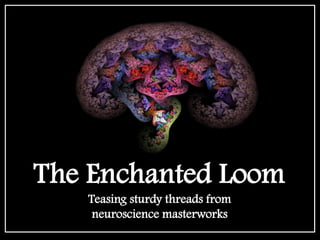The Enchanted Loom reviews David Linden's book, The Compass of Pleasure
- 1. The Enchanted Loom Teasing sturdy threads from neuroscience masterworks
- 3. Thread 1: Shopping, learning, gambling, prayer, orgasm, and altruism all trigger pleasure circuits in the Ventral Tegmental Area deep in the brain. (pg. 3)
- 4. Thread 2: What makes pleasure so compelling is that we adorn it with associations, emotions, social meaning, sights, tastes, sounds and smells. (pg. 26)
- 5. Thread 3: A whole lot of what drugs do to the mind is in the mind. (pg. 42)
- 6. Thread 4: Many cultural influences insist that obesity is a failure of willpower. Genetic evidence argues strongly against that idea. (pg. 80)
- 7. Thread 5: Fats and sugars are super- addictive, producing larger jolts to the pleasure circuits together than either one alone. (pg. 84)
- 8. Thread 6: Portions of the prefrontal cortex become deactivated in people newly fallen in love. (pg. 103)
- 9. Thread 7: Some men and women can reliably achieve orgasm through thought alone without any touching whatsoever. (pg. 111)
- 10. Thread 8: Any sound, smell, sight or memory can become associated with pleasure and can thereby become pleasurable in itŌĆÖs own right. (pg. 135)
- 11. Thread 9: The opposite of love is indifference; the opposite of pleasure is not pain, but ennui- a lack of interest in sensation and experience. (pg. 154)
- 12. Thread 10: Knowledge for the sake of knowledge can engage the pleasure/ reward circuitry. Some ideas can be as addictive as drugs. (pgs. 168-169)
- 13. Image Credits: Title Page: http://www.rappler.com/science-nature/23193-personality-traits-brain-scans ║▌║▌▀Ż 3 - http://bit.ly/1KunJ4e ║▌║▌▀Ż 12 - http://www.deviantart.com/art/Inspiration-152043778 ║▌║▌▀Ż 2 - http://en.wikipedia.org/wiki/David_Linden ║▌║▌▀Ż 6 - http://www.deviantart.com/art/obesity-155829715 ║▌║▌▀Ż 5 - http://theotherlandofoz.com/2014/07/13/happy/ ║▌║▌▀Ż 11 - http://www.deviantart.com/art/Boredom-306217907 ║▌║▌▀Ż 10 - http://www.deviantart.com/art/Smells-And-Sensations-356651059 ║▌║▌▀Ż 14 - http://www.rappler.com/science-nature/23193-personality-traits-brain-scans ║▌║▌▀Ż 9 - http://www.deviantart.com/art/Orgasm-458607713 ║▌║▌▀Ż 8 - http://www.deviantart.com/art/first-love-429739657 ║▌║▌▀Ż 7 - http://www.deviantart.com/art/Sugar-227111621 ║▌║▌▀Ż 4 - http://oak-art-gallery.deviantart.com/art/PLEASURE-176665796
- 14. Mark Brady, PhD TheEnchantedLoom@gmail.com to Subscribe or receive the Powerpoints for Free Thank you for viewing !














